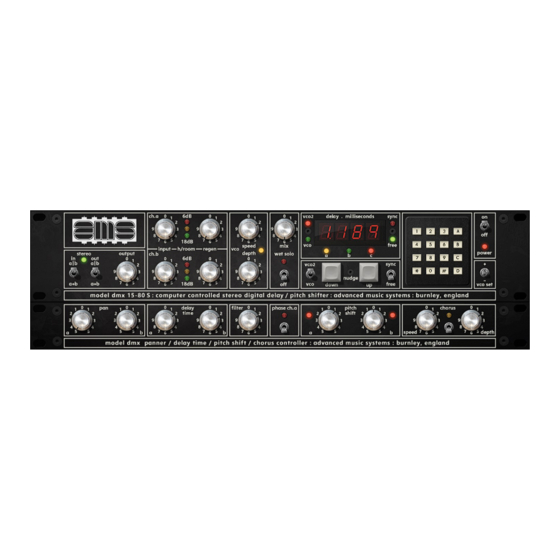
Advertisement
Quick Links
DMX 15-80 S : Digital Delay / Pitch Shifter
User Manual
Issue 1
own the copyright of all
© 1980 - 2021 AMS Neve Ltd
information and drawings contained in this manual which are not
to be copied or reproduced by any means or disclosed in part or
whole to any third party without written permission.
As part of our policy of continual product improvement, we
reserve the right to alter specifications without notice but with
due regard to all current legislation.
Disclaimer: The information in this manual has been carefully
checked and is believed to be accurate at the time of publication.
However, no responsibility is taken by us for inaccuracies, errors
or omissions nor any liability assumed for any loss or damage
resulting either directly or indirectly from use of the information
contained within it.
HEAD OFFICE AMS Neve Ltd | AMS Technology Park | Billington Road | Burnley | Lancashire | BB11 5UB | ENGLAND
TELEPHONE +44 (0) 1282 457 011
FAX +44 (0) 1282 417 282
WEB www.ams-neve.com
Advertisement

Summary of Contents for AMS DMX 15-80 S
- Page 1 HEAD OFFICE AMS Neve Ltd | AMS Technology Park | Billington Road | Burnley | Lancashire | BB11 5UB | ENGLAND TELEPHONE +44 (0) 1282 457 011 FAX +44 (0) 1282 417 282 WEB www.ams-neve.com...
- Page 2 Introduced in 1978, the AMS DMX 15-80 S was the world's first microprocessor controlled, 15-bit digital delay and pitch shifter. Used on classic albums by Joy Division, Nirvana, Brian Eno, and many more, the AMS DMX is famous for adding its iconic '80's-era space and depth.
- Page 3 New Plug-In Only Functionality While the original AMS DMX 15-80 S hardware had to be patched into a console to combine dry signal with the two processed channels, the DMX plug-in provides Wet/Dry Mix and Pan controls, allowing a creative variety of blended signal and width effects.
- Page 4 This block-style signal flow diagram can help in understanding the feature section interactions and how the overall system processes incoming audio. This diagram represents both internal processing blocks and signal level user controls. DMX 15-80 S : Digital Delay / Pitch Shifter - 4 -...
- Page 5 LEDs are illuminated all the time, the yellow LEDs most of the time and the red LEDs illuminate only when the highest programme peaks occur. DMX 15-80 S : Digital Delay / Pitch Shifter - 5 -...
- Page 6 The DDL, as in the case of the DMX 15-80 S, should not alter or modify the signal no matter what delay is programmed. The DMX 15-80 S has two such delay lines which are independently programmable.
- Page 7 — all the way to chaos-infused, near self-oscillation regeneration at the highest settings. It is obvious that a great deal can be accomplished using the DMX 15-80 S besides simple delay. A proportion of the output of a channel may be fed back to those channels input by adjustment of the respective regenerative control knob.
- Page 8 VCO oscillation to a zero-crossing position with either a positive or negative excursion, handy when used in automation to ensure the normally free-running VCO provides precisely repeatable VCO behaviours. DMX 15-80 S : Digital Delay / Pitch Shifter - 8 -...
- Page 9 Pitch Shift Section Pitch shift is the AMS DMX 15-80’s centrepiece feature; its ‘de-glitch’ algorithm was a sea-change technological breakthrough when released. Pitch control technology has advanced steadily in the subsequent decades, but the DMX’s design (perhaps ‘imperfect’ design by today’s standards) provides an era-defining sound that has not lost its appeal and musicality and is used to this day by many audio professionals.
- Page 10 ‘9’ and the speed control between ‘2’ and ‘3’; as the delay setting is increased however, the depth setting will have to be decreased to retain a reasonable ADT effect. DMX 15-80 S : Digital Delay / Pitch Shifter - 10 -...
- Page 11 The first click of the ‘D’ key will interrogate the current value on the 7-segment display, after one second this display will revert. DMX 15-80 S : Digital Delay / Pitch Shifter - 11 -...
- Page 12 • Click any control in the plug-in or use the "esc." key on your computer keyboard to clear the "Err" display. The correct entry can then be re-entered. DMX 15-80 S : Digital Delay / Pitch Shifter - 12 -...
- Page 13 When adjusting Mix, the Mix value (0.0 to 100) is temporarily displayed and Identifier LEDs are temporarily de-illuminated. • When adjusting any other rotary control, the control's value is temporarily displayed (0.0 to 10.0) and Identifier LEDs are temporarily de-illuminated. DMX 15-80 S : Digital Delay / Pitch Shifter - 13 -...
- Page 14 1.122, then 1.26 then 1.335 etc., etc. The above can be modified to suit any scale characteristics and is only restricted by the operators imagination. DMX 15-80 S : Digital Delay / Pitch Shifter - 14 -...
- Page 15 (1) ------------------------------------------------- 1.059 ------------------------------------------------- 1.122 ------------------------------------------------- 1.189 ------------------------------------------------- 1.260 ------------------------------------------------- 1.335 ------------------------------------------------- 1.414 ------------------------------------------------- 1.498 ------------------------------------------------- 1.587 ------------------------------------------------- 1.682 ------------------------------------------------- 1.782 ------------------------------------------------- 1.888 ------------------------------------------------- octave (1') ------------------------------------------------- DMX 15-80 S : Digital Delay / Pitch Shifter - 15 -...
- Page 16 Original Signal Diagram from Hardware User Manual DMX 15-80 S : Digital Delay / Pitch Shifter - 16 -...




Need help?
Do you have a question about the DMX 15-80 S and is the answer not in the manual?
Questions and answers